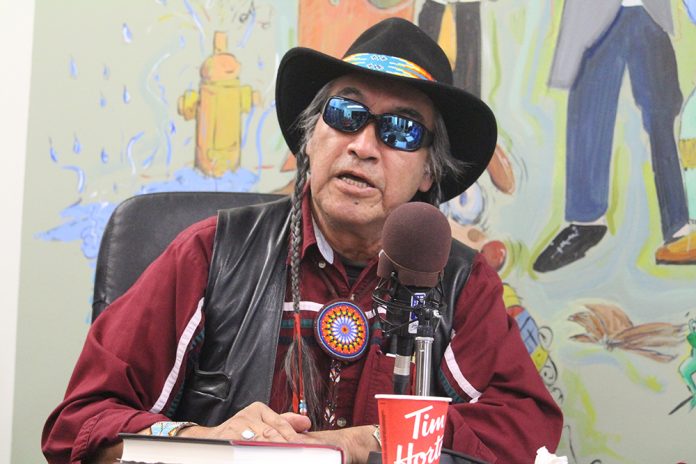

Residential school survivor and Indigenous author Antoine Mountain told a Canoe FM audience that the way to reconciliation is not a report made by politicians which can be put aside and forgotten.
“That’s not the way life is. Life is all about your next-door neighbour,” Mountain said. “What we believe in our culture is that person with the ability to answer your prayer, your needs, is going to meet you halfway. That’s the way I look at reconciliation.
“I can’t just go around saying you’re the bad person, I’m the good one. There’s nobody like that in real life.”
Canoe FM hosted the acclaimed artist and writer Oct. 3. He was promoting his new memoir From Bear Rock Mountain: The Life and Times of a Dene Residential School Survivor. T
he station had him on for a live audience event as Larry O’Connor interviewed him for the recorded Indigenous radio program Tales from the Big Canoe. O’Connor said Mountain’s friends Pat McCann-Smith and Peter Smith of Kennisis Lake asked him to come to Haliburton to share his book.
“We had a nice, little, cozy turnout here,” O’Connor said. “The opportunity to speak to an elder, a Dene elder with so much wisdom, an author, has just been incredible. I feel quite blessed.”
O’Connor asked Mountain about the book, which details Mountain’s life through writing, poetry and art. Mountain said his book features his personal growth. The Northwest Territories activist is currently a fifth-year student at Trent University, working towards his Ph.D in Indigenous studies.
“Wanting to continue working with the youth to prove to them there is an alternative to jails, drugs,” Mountain said. “I want to create some kind of environment for future artists that they’d be able to express themselves in the very high levels of education.”
O’Connor also asked Mountain to offer advice to the youth leading the climate change protests of today. Mountain said he attended one and said he supports them, but they are
much different from some of the major social protects he recalls from the civil rights era.
“I’m standing with one of my brothers, going, ‘where are the cops going by to bash our heads in? This is not a real demonstration’,” Mountain said. “It’s really good for me to see the young people are doing this … the water, climate change, the climate itself isn’t particularly interested in how it’s being saved. The land itself is not particularly interested in who is doing the same. It’s something that simply needs to be done.”
O’Connor said he hopes people listening went away with a better understanding of reconciliation.
“Reconciliation isn’t just one-sided. It’s First Nations, Métis and Inuit coming forward and meeting with settlers, colonizers to have that conversation and some of it is difficult conversations about the past. Much like you’ll find on my program, but also celebrating the relationship because it’s not all bad,” O’Connor said.




